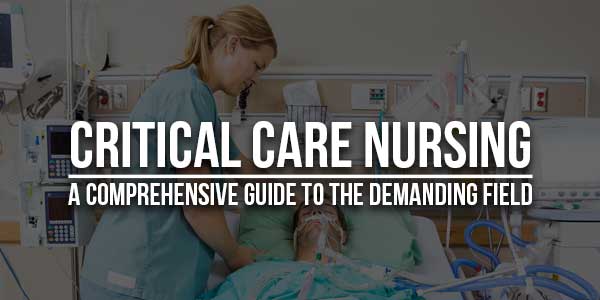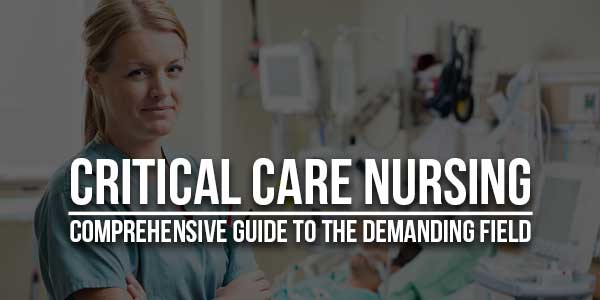
Picture a world where superheroes don’t wear capes – but instead don scrubs and carry stethoscopes! This is the world of critical care nursing, where these amazing heroes battle alongside doctors and medical teams, doing all they can to save lives. If you’ve ever been witness to a life-threatening situation, chances are you’ve encountered the dedication and expertise of these exceptional individuals already.
Critical care nurses possess a unique set of skills honed to perfection through rigorous training. In Australia as is the case in most countries across the world, the demand for these exceptional professionals far outweighs the supply due to the ongoing shortage of skilled registered nurses.
Embarking on a career in critical care nursing promises to be an immensely fulfilling and rewarding journey. As a critical care nurse, you’ll play a pivotal role in life-and-death situations, and right from the first patient assessment to end-of-life care, you’ll be at the forefront of crucial treatments and actions. Critical care calls for a special kind of nurse who can navigate the complexities of critical care units with skill, empathy, and unwavering strength.
In this blog, we’ll introduce you to the life and responsibilities of a critical care nurse. Read on to know more!
Table of Contents
What Are The Duties Of A Critical Care Nurse?
Critical care nursing involves working in close collaboration with a team of doctors and specialists to assess, treat, and monitor critically ill patients while also becoming a patient advocate, and providing their basic care. Here are some of the duties of a critical care nurse:
Assessing And Treating Patients:
In the fast-paced world of critical care, every second counts! Critical care nurses have the responsibility of assessing each patient’s condition and initiating the necessary treatments, right from monitoring vital signs to skillfully dressing wounds. As an ICU nurse, you’ll find yourself managing intricate medical equipment, interpreting complex data, and administering life-sustaining medications.
Ordering Diagnostic Tests:
You may have to order essential diagnostic tests for your patients, so you should have enough knowledge at your fingertips to be able to do so. Critical injuries and illnesses demand swift action, and it could fall to you to send orders for X-rays, EKGs, or CT scans. Working closely with doctors, you will analyze and interpret the test results, and help with the path to recovery.

Acting As A Patient Advocate:
But it’s not just about technical prowess; it’s about being a pillar of support for patients and their families during this time! You will have to comfort, reassure, and offer solace to those whose physical and emotional well-being hangs in the balance. As a critical care nurse, you will assume the role of a patient advocate, and your unique blend of support, education, and empathy will come into play as you act as a liaison between patients and their doctors.
Monitoring Medical Equipment:
Many patients in the ICU rely on cardiac monitors or ventilators to sustain their lives, and it is your responsibility to set up and monitor these vital machines. You should ensure that these devices function optimally, allowing you to track a patient’s progress, make necessary adjustments, and intervene swiftly when the need arises.
Wrapping Up
So, if you’re considering a career in critical care nursing, take a moment to reflect on the profound impact you can have. The world needs compassionate and skilled critical care nurses now, more than ever before! While this is indeed an immensely challenging field, the rewards are immeasurable. And as a critical care nurse, you’ll find that every heartbeat counts, and every life you touch becomes a testament to the power of compassion and the triumph of the human spirit.
What’s The Next Step?
If you’ve decided that a career in critical care nursing is for you, the next step is choosing the right nursing program that will equip you with the knowledge, skills, and experience needed to thrive in this demanding field. With a multitude of options available, it’s crucial to carefully weigh your choices and select the program that is the right fit for you.
In order to practice Critical Care Nursing in Australia, you must be a qualified Registered Nurse and have an advanced degree such as a Graduate Certificate in Critical Care Nursing, a Graduate Diploma in Nursing, or a Master of Nursing with a specialization in critical care or intensive care. You can also explore Graduate Certificate in Advanced Nursing (Specialisation Acute Care Nursing) or the Graduate Certificate in Advanced Nursing (Specialisation Critical Care Nursing). These AQF (Australian Qualifications Framework) Level 8 programs are designed to help you develop critical and acute care nursing strategies and abilities. These carefully structured programs can also serve as an entrance point if you are interested in pursuing a Master of Nursing degree in Australia.
We wish you all the very best!
FAQs:
Q1. What Qualifications Do Critical Care Nurses Have?
Critical care nurses typically have the following qualifications:
- Education: They have completed a nursing program and obtained a nursing degree (usually a Bachelor of Science in Nursing).
- Licensure: They are typically licensed registered nurses (RNs).
- Certification: Many critical care nurses pursue additional certification to specialize in critical care. For example, they may obtain the Graduate Certificate in Advanced Nursing (Critical Care Nursing).
In addition to their qualifications, critical care nurses often have experience working in general nursing before transitioning to critical care, allowing them to gain a solid foundation in patient care and nursing skills.
Q2. What Are The Responsibilities Of A Critical Care Nurse?
The responsibilities of a critical care nurse include, among others:
- Monitoring patients
- Administering treatments
- Collaborating with healthcare teams
- Providing emotional support
- Educating patients and families
- Responding to emergencies
Q3. What Types Of Patients Do Critical Care Nurses Care For?
Critical care nurses care for patients who require intensive and specialized medical care. These patients may include critically ill or injured patients, patients with life-threatening conditions, patients in post-operative recovery, patients on life support, and others.
Q4. What Are The Challenges Of Working In Critical Care Nursing?
Working in critical care nursing comes with several challenges, including:
- High-pressure environment: Critical care nurses work in fast-paced and high-stress environments where they must make quick decisions and prioritize patient care effectively.
- Emotionally demanding: Dealing with critically ill or injured patients and their families can be emotionally challenging, requiring nurses to provide support while maintaining professional composure.
- Complex patient conditions: Critical care nurses care for patients with complex medical conditions, requiring advanced knowledge and critical thinking skills to provide specialized care.
- Long and irregular hours: Critical care nursing often involves working long shifts, including nights, weekends, and holidays, to ensure round-the-clock patient care.
- Physical demands: The work of critical care nurses can be physically demanding, as they may need to assist with patient transfers, perform CPR, or handle heavy medical equipment.
- Ethical dilemmas: Critical care nurses often face ethical dilemmas regarding end-of-life care, resource allocation, and balancing patient autonomy with the best interests of the patient.
Despite the challenges, critical care nursing can be highly rewarding, as it allows nurses to make a significant impact on the lives of critically ill patients and their families.

 About the Author:
About the Author:








Be the first to write a comment.